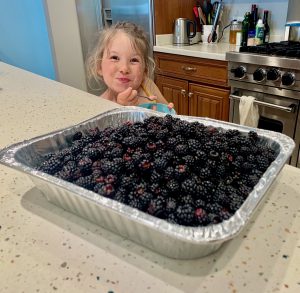Hacks to Habits
What did the salad greens say to the hungry person? We will make your mouth and body happy if you “let-tuce”!
Fruits and vegetables have a high nutrient density and fiber content and offer an abundance of health benefits, including enhancing gut microbiota and reducing the risk of multiple diseases. In addition, a growing body of research shows that people who eat fruits and vegetables express higher levels of life satisfaction and happiness than those who eat very little. Eating fruits and vegetables is also associated with positive feelings. (1,2)

But, nine out of 10 Americans don’t consume the recommended amount of fruits and vegetables. Close to one-quarter of Americans do not eat any fruit. (3)
What gets in the way of us eating enough fruit and vegetables?
The Produce for Better Health Foundation did a study that found that people who eat fruits and vegetables more often reported similar barriers to those who don’t eat as much. Both groups said barriers included finding options that appeal to the whole family, lack of preparation skills, and physical limitations. But, those who ate more fruits and vegetables found ways to overcome them.
The study discovered some hacks (clever solutions to tricky problems) that people who eat more fruits and vegetables do. These hacks helped them overcome the barriers, and we can get ideas from them and see if any might work for us. These hacks helped make eating fruits and vegetables a habit. Habits are automatic behaviors that have been internalized. Habitually eating more fruits and vegetables can help you make better choices even when self-control is low. Research has proven over time that habits even outperform willpower! (4,5)
Here are some convenience and usage hacks that those who eat more fruits and vegetables do more often than those who don’t. Maybe one of these hacks will also work for you. The ‘bean’efits can’t be ‘beet’!
What do those who eat more fruits and vegetables do? They…
-

Making vegetables part of the meal with this caprese-like sandwich. Photo by L. Ali. keep fruit on the counter.
- prepare fruit ahead of time for use later.
- put prepped produce at eye level in the refrigerator.
- have a variety of fruit and vegetable forms on hand.
- top favorite foods (such as cereal and yogurt) with fruit.
- have ready-to-use vegetables for easy meal starters.
- add vegetables to sandwiches and burgers.
- plan snacks and meals ahead of time that include vegetables.
- enhance the flavor of fruits and vegetables with herbs and spices.
- serve produce before the main meal.
- prepare and/or eat meals and snacks as a family.
In addition, most people who eat more fruits and vegetables eat more than one type of fruit or vegetable each day. For example, among high-frequency vegetable eaters, only 1% eat only one type of vegetable per day, while 31% of low-frequency vegetable eaters consume only one type. Variety can help!
Knock, knock!
Who’s there?
Bean.
Bean who?
Bean a while since I last saw you.
Have an extra fruit or vegetable today! I must say, they make me feel good from my head ‘to-mat-oes’.
- Produce for Better Health Foundation. Novel Approaches To Measuring & Promoting Fruit & Vegetable Consumption. Produce for Better Health Foundation website. Published 2017.. https://fruitsandveggies.org/wp-content/uploads/2019/04/ Novel-Approaches-Executive-Summary.pdf
- Mujcic R, Oswald AJ. Evolution of Well-Being and Happiness After Increases in Consumption of Fruit and Vegetables. Am J Public Health. 2016;106(8):1504-1510. doi:10.2105/AJPH.2016.303260
- PBH Hacks to Habits Executive Summary, 2022. https://fruitsandveggies.org/wp-content/uploads/2022/10/PBH-Hacks-To-Habits-Executive-Summary-2022-10-7-2022.pdf
- Neal DT, Wood W, Drolet A. How do people adhere to goals when willpower is low? The profits (and pitfalls) of strong habits. J Pers Soc Psychol. 2013;104(6):959.
- Galla BM, Duckworth AL. More than resisting temptation: Beneficial habits mediate the relationship between self-control and positive life outcomes. J Pers Soc Psychol. 2015;109(3):508-525. doi:10.1037/ pspp0000026
 0
0

